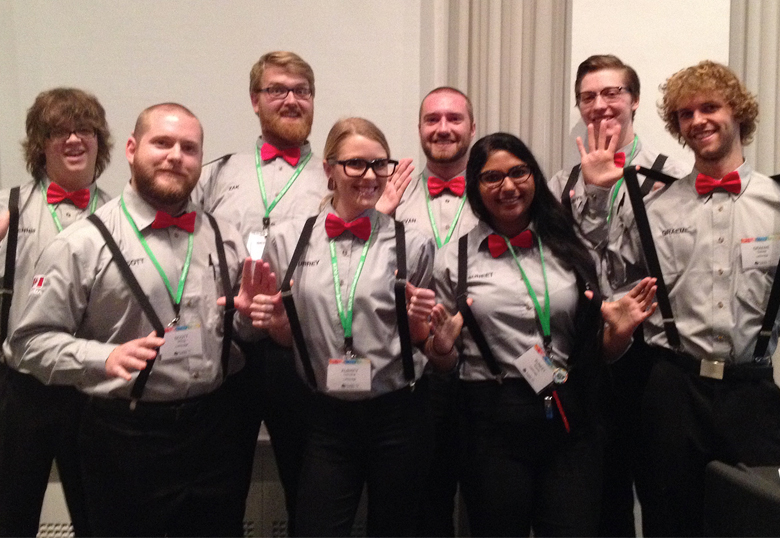On the strength of a project that may one day lead to a new cell therapy to repair damaged neurons in the brain, the University of Lethbridge iGEM (international genetically engineered machine) team was awarded a gold medal at the iGEM Giant Jamboree 2014 in Boston from Oct. 30 to Nov. 3.
Known as the Lethbridge Brainiacs, the iGEM team chose an ambitious project that involved using the brain’s own immune cells to facilitate recovery following a brain injury such as stroke.

“I was dumbfounded and exhilarated,” says Evan Caton, a doctoral student in biomolecular sciences. “This is my first year at iGEM and there were some other really amazing teams there. It was pretty awesome just to be in Boston and be rewarded for the work that we’ve done over the past year.”
“It was satisfying because we worked quite hard this summer and the gold medal is one of the higher standards of achievement at iGEM, so it’s nice to be recognized for that,” says Zak Stinson, a master’s student in neuroscience.
The team picked a neuroscience project that involves engineering immune cells to identify astrocytes (cells that play a role in the scarring process) and reprogram them to become normal neurons.
“When you have a stroke your neurons die and they don’t grow back. By this system, we would be able to replace those lost neurons and hopefully enhance functional recovery after a stroke and traumatic brain injury,” says Stinson. “We were able to take some pretty big steps towards getting this targeting and delivery system built. We weren’t able to test it fully because it was a really ambitious project for one summer, but we got quite a long ways towards showing that we could package these genes in these cells and send them over to astrocytes.”
The project involved inter-disciplinary collaboration. Individual members brought their respective expertise in biochemistry, biology, art and neuroscience to the team.
“The students are actually integrating expertise we have at the U of L into that design project. The students are the force that allows us to integrate existing strengths into a new application,” says Dr. Hans-Joachim Wieden, a team supervisor and Alberta Innovates Technology Futures Research Chair in Bioengineering in the chemistry and biochemistry department.
More than 220 teams from post-secondary institutions around the world participated in the 10th annual jamboree, with the U of L team being one of two from Alberta and one of 10 from Canada.
“Alberta has actually made up a large portion of the iGEM teams from Canada and they’ve done really well in the past because we have really good support from the provincial government,” says Stinson.
With the Jamboree now complete, team members are busy getting ready for the fourth annual Brick by Brick charity dinner and silent auction Saturday night at the Dr. Foster James Penny Building.
“This year the charity is 5th on 5th Youth Services,” says Caton. “They are facing funding challenges and are at risk of losing a number of programs which could affect thousands of young people.”
The iGEM team has hosted a charity event for the past three years as a way to give back to the community that has supported them throughout the year. As far as Stinson and Caton know, the U of L iGEM team is unique in hosting such an event.
"We got silent auction items from all over the community so the community has been really open to helping us,” says Caton.
All proceeds from the Brick by Brick event will go to 5th on 5th. Although tickets are sold out, anyone wanting to help the organization can donate online through the 5th on 5th Youth Services website.
